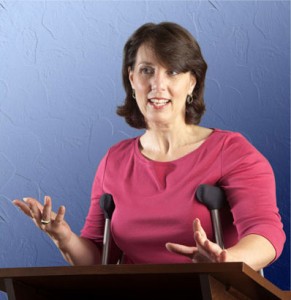 We are all inter-connected. What you see as an obvious disability in me is really no different than something about you that simply can’t be seen so easily. My passion is creating bridges between what seem like insurmountable differences.
We are all inter-connected. What you see as an obvious disability in me is really no different than something about you that simply can’t be seen so easily. My passion is creating bridges between what seem like insurmountable differences.
I am always eager to speak to groups to diffuse the stress and uncertainty with a “tell it straight” set of recommendations for putting everyone at ease.
Contact me to discuss your specific populations and needs. The topics listed below can be delivered in various formats: keynotes, workshops, and half- and full-day training.
Naming the Elephant in the Room: Disability Sensitivity & Communication
What makes it so challenging to be open and direct about the taboo topic of disability? Few people have the know-how to effectively engage with people with disabilities. It’s not something we’re taught. More significantly, it’s a taboo topic that, starting as children, we are shamed for seeing and naming. The result is often unnecessary misunderstandings, unmet expectations, frustration and disappointment.
In American culture, there are few norms to anchor our understanding of how to engage in a way that sees the person first, not the disability. We can learn to acknowledge the whole person, including their uniqueness related to their disability.
Marianne’s wisdom and personal stories offer insight into how to become more comfortable meeting, talking, working or socializing with someone with a disability. Learning to be real and speak clearly about disability can open the channel for important and heart-felt exchanges between people who were once separated by something as simple as a crutch.
Seeing, Valuing & Celebrating Our Differences
Our unique life experiences have contributed to who we are today. When people ask questions and acknowledge our difference, we get a chance to share that part of who we are with them. And we feel fully seen, heard and valued.
Consider the missed opportunities for connection and learning due to ignorance or simply choosing to dismiss the obvious. Cultivating curiosity about and compassion for those who are different leads to greater understanding, increased creativity and enhanced collaboration.
Marianne is candid about her own blind spots and lessons learned along her path to being a more open and accepting individual. You will be sure to recognize yourself in the scenarios she relates, but you will come away both entertained and enlightened to a new way of seeing the truth of our shared life paths.
Living with a Disability: From Universal to Personal and Back
My journey, from childhood “rejection” of my disability to adult “acceptance”—and with a few swings back and forth in between—has been my unique story but also filled with many of the issues that confront all individuals who live with a disability. Some of he aspects of disability I discuss, referencing my own experiences, include:
- Acceptance & Adjustment—the relationship with disability & the body
- Emotional—feelings related to living with disability
- Social and Support Systems—how these develop & change
- Spirituality—the meaning and Purpose of disability
Marianne’s candor and humor help everyone—living with disability or not—embrace their imperfections and come to understand the universal longing for “normal.”
The Unique Issues & Stresses of Parenting a Child with Special Needs
All parents love their children, but the physical and emotional demands of caring for a child with special needs can deplete even the most resilient. It is challenging to maintain a “normal” schedule and lifestyle, especially long-term. Parents find themselves stuck in the middle between their desire to live a “normal” life, while needing to navigate the maze of health care, education, social services, and legal systems on behalf of their child. In addition, parents are responsible for researching and making complex decisions that impact the life of their child.
Marianne offers insights from the “grown-up” child’s perspective that will help parents more smoothly navigate the unique challenges of caring for their child with special needs.
Supporting Employees who Have a Disability or Have a Child or other Dependent with Special Needs
“Work-Life Balance” is a pretty popular buzz word these days, and elusive for many. As an employer or colleague you may feel busy, stressed and overwhelmed with many responsibilities. Unless you have experienced the role of caretaker, you have no idea how time-consuming and exhausting this job can be.
Marianne will discuss the signs of burnout and offer suggestions for helpful support and resources to tap for ongoing care and nurturing.
Exceptional Caregiving
Whether the caregivers are tending to an elder parent, ill spouse or a child with special needs, caregivers are feeling the squeeze — between family and career, guilt and ability, time and distance, and finances and responsibilities. Caregivers face the challenge of juggling responsibilities and often create patchwork arrangements to provide appropriate care – the more intense the care, the more juggling.
Even with the ability to make adjustments on the job, caregivers may still struggle in the workplace due to barriers created by non-supportive supervisors and co-workers. As a result, they may be reluctant to disclose their caregiving situations for fear of stigma, blame, or discrimination.
Marianne will tap into the compassion that exists beneath our professional veneers. Through reaching out to others under stress, we also give ourselves permission to be multidimensional beings expressing our full humanity.